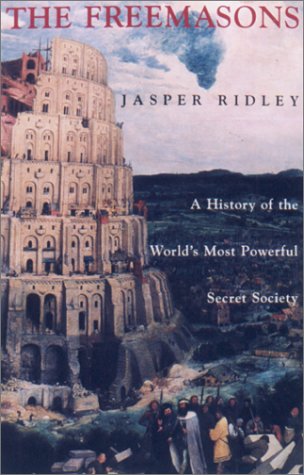The Freemasons
A History of the World's Most Powerful Secret Society
Jasper Ridley
With a title as ominous as this, it's inevitable that the book would cause a stir. Masons - at least the Masons of today - don't like to be referred to as "powerful" and/or "secret", each of those words having a considerable amount of 'baggage' with some very negative connotations.
I'd read a couple of passing comments about this book which was released in the UK well before it arrived in the US. Because of its title, I chose not to get it immediately upon publication but now I wish I'd done so.
Mr. Ridley has taken a daunting subject - the world-wide history of an organization composed of hundreds of sovereign entities - and attempted to make it both interesting and readable for the general audience. It's a task which others have tried in the past but most have been writing their material for the Masonic membership which already had a background in the customs and traditions of the fraternity. Ridley starts at 'square one' and moves, sometimes in a lurching fashion, forward. It should be quickly noted, though, that - as with any history - events occur at different times in different places. There's simply no smooth timeline which could be easily read when it comes to either world events or Freemasonry's developments.
It should be noted too that Mr. Ridley is not a Mason. At the outset of the book, in fact, his comments seemed to be somewhat overly critical and his debunking of the imagined Masonic involvement by some of our 'Masonic heroes' was the cause of a bit of teeth gnashing on my part. At one point, in fact, it seemed as if Mr. Ridley had simply written a work to prove that those we praised as Masons of the past had little if anything to do with the organization after they'd become members. That notwithstanding, however, it's only fair that the truth be told - and any Mason can attest that the initiation ceremonies are much like a bell that once rung, cannot be reversed. It remains to be seen, therefore, whether those who eschewed Freemasonry later in their careers ever truly forgot the deep moral lessons they were taught.
Mr. Ridley also made excellent points about the attraction Masonry held for some. He notes (without judgment) that as Masonic lodges in France prior to the Revolution were whispered to be a place for revolutionary discussion (without basis), they attracted those interested in revolution. Those members soon left, though, finding Freemasonry's restrictions regarding matters of political or religious nature to be too restrictive. As he points out, particularly during the French Revolution, those who believed they'd find something in Freemasonry which would further their personal/political goals joined for that very purpose but were soon disappointed.
The closing chapter was, for me, the best. Writing about anti-Masonry, Mr. Ridley notes that our opponents have little if any basis for their frenzied charges of evil conspiracy or a separate religion. I think if I'd read the last chapter first, I would have been far less 'on edge' during the rest of the book.
It's a fair and objective presentation of Freemasonry and it will likely teach even well-read Masons something. I'd strongly recommend this book to anyone and suspect I'll be giving copies as gifts for the coming holiday season! Check it out: you won't be disappointed!
![]()
![]()
![]()
![]()
![]()
Five Thumbs Up





